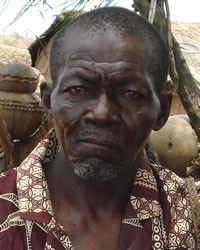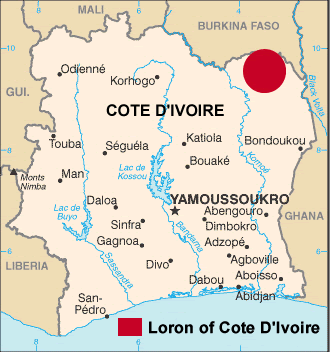The Loron people, variously named Lorhon, Tenbo, Teguessie and Tuna, who are located in forested savannah region of northeast Cote d'Ivoire and southwest Burkina Faso, came originally from the Bouna region of Cote d'Ivoire. Their language, which is called Teen, is 45% cognate with that of the Koulango people in the Bouna area, although their culture reflects that of the Lobi people.
At least 250 years ago, when many Loron/Tenbo people were killed in warfare with other tribal groups from the south of Cote d'Ivoire, the Tenbo fled the Bouna region. They moved north along the Black Volta river, and then west, and settled in the area that is now the town of Gaoua, Burkina Faso, about 100 miles (160kms) from Bouna, Cote d'Ivoire.
When the Lobi people moved into the Gaoua area from Ghana in the late 18th century, the Tenbo, like most other smaller ethnic groups in the region, adopted many of the customs of the dominant and more numerous Lobi. Although, to this day, the Tenbo (Tuna in the Lobi language) are still considered the 'Masters of the Land' in the Gaoua area.
To avoid conflict with their neighbouring tribes, the relatively timid Tenbo went in search of new pastures. Most of the Tenbo people gradually migrated south, to the mountains which form the border between Burkina Faso and Cote d'Ivoire, just below the Tenbo town of Kampti. Approximately 100 years ago a large group of Tenbo people moved further south, out of the mountainous region and settled in a more fertile area, in Cote d'Ivoire, between Doropo and Tehini. This all happened before country demarcation lines were created by the French colonialists.
The majority of Tenbo people are subsistence farmers, living in small villages of between 50-100 people. Families normally live in homesteads separated from other families by small planting areas. As with the Lobi people, 'Two reaches of an arrow' represents an appropriate distance between two Tenbo family homesteads. The Tenbo in both Cote d'Ivoire and Burkina Faso are probably among the least developed people groups in their respective countries. They normally live in isolated areas with limited access to schools, medical facilities, or potable water.
The Tenbo people are animist in the sense that they believe that the inanimate objects that they create represent the spirit world. They fabricate fetishes, or idols, (punibo) from wood, clay, or metal. Appeasing the demands of these 'gods' dominate every aspect of their lives. They believe God (Nyelye, also their word for sky) created everything, but 'it' has no further interest in people. They believe that a wide range of supernatural beings and invisible spiritual powers control and shape their lives. The Tenbo people offer sacrifices to their idols to ensure, among other things, an adequate food supply, protection from spirits that can harm or kill, healthy children, and community harmony. They have many taboos and rituals that they need to respect throughout their lives to avoid sickness, death, or misfortune.
During the first part of this century, political conflict and economic uncertainty in Cote d'Ivoire made a difficult situation for the Tenbos even worse. However, in recent years, government schools and medical care have improved. Water pumps have recently been installed in several new areas, but many Tenbos in smaller villages still obtain their water from local swamps and waterholes.
Pray for evangelism and church planting. Ethnos360/New Tribes Mission (NTM) missionaries started working among the Tenbo people of Cote d'Ivoire in 1984, and evangelism in the Teen language began in 1992.
Pray for continued growth, both numerically and spiritually, of Tenbo believers and churches.
Pray that many Tenbo people in Burkina Faso will respond to God's offer of salvation through Jesus Christ.
Pray that many more Tenbo people will become literate. Literacy courses are regularly taught in around fifteen locations.
Praise the Lord for the completion of the translation of the New Testament into the Loron language. The New Testaments are currently being printed in the Netherlands and are scheduled to arrive in Cote d'Ivoire in early 2026.
Scripture Prayers for the Tenbo, Loron in Côte d'Ivoire.
| Profile Source: Joshua Project |











